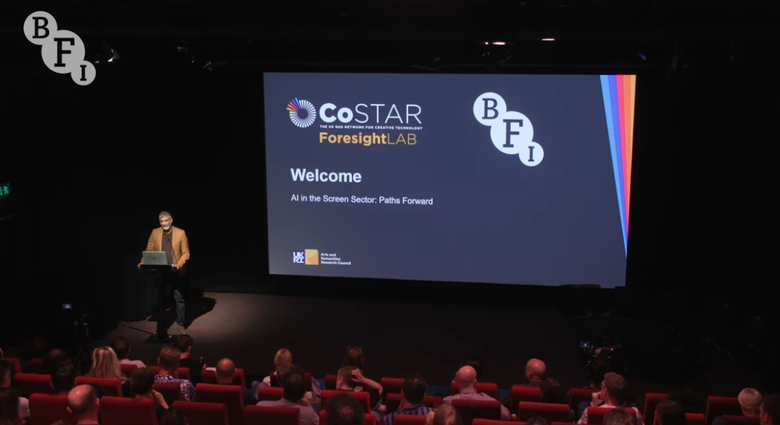Foresight Lab convenes screen sector to discuss ‘paths forward’ on gen AI

Foresight Lab convenes screen sector to discuss ‘paths forward’ on gen AI
Event builds on Lab’s June 2025 report exploring generative AI use cases and experimentation across the film, high-end television and video games industries
The CoSTAR Foresight Lab hosted a packed industry event last month at BFI Southbank to discuss ‘paths forward’ for the UK screen sector in the era of generative artificial intelligence (AI).
The event was designed as a follow-up to the Lab’s well-received June 2025 report, ‘AI in the Screen Sector: Perspectives and Paths Forward’ – a first UK-wide exploration of generative AI use cases and experimentation across the film, high-end television and video games industries.
Attendees from screen production houses, sector bodies, and creative technology and AI companies were briefed on the report’s recommendations and published roadmap, which point the screen sector towards ethical, sustainable and inclusive AI integration.
Rishi Coupland, the CoSTAR Foresight Lab’s director of insight and the BFI’s director of research and industry innovation, introduced the event as an opportunity to bring people in the sector together to have an “empowered discussion” about AI, “where rather than AI happening to us, it is something that we feel we can have agency in”.
The event featured a panel, chaired by Metaphysic.ai founder Martin Adams, which dived into many of the takeaways from the report, including the importance of AI transparency and education, and the vital role of human storytelling and creativity. The panel also wrestled with the challenge posed by the growing volume of AI-generated content and what that might mean for traditional business models, how AI capabilities may evolve in future, and how to use AI tools responsibly.
Invited panellists
Phil Adlam, chief technology officer, Production Park and CoSTAR Live Lab
Katharina Gellein Viken, co-chief executive, Metrotone Studios
Kathryn Webb, managing director, AIMICI
Graham Jack, chief technology officer and co-founder, beloFX
Panel quotes
“The debate around AI has a tendency to become ultra-polarised between the tech companies telling us it's going to be the best thing ever and change all of our lives for the best, and some in the creative industries fearing that it's going to destroy life as we know it. If we're going to move forwards and find the right pathway, having conversations like this, where we can dig into the nuts and bolts of it, is the way forward.”
“Partly why people get very excited about AI [is] because it's a democratiser. I've never been able to draw as a director, for example. So now I can visualise what my vision is and I can show somebody and go, ‘Look, here's the story world. Here's the characters. Do you want to buy that?’ And that's exciting. But it does become a monetisation problem because the AI world right now is putting out stuff online. Well, that's not a business model. That's not a product that you can sell.”
“We don't want to stifle creativity. We want those new movies. We want those new experiences. We all do, and AI is going to release people to have a voice that was never there before. But the old world – our industry, the people I love, the jobs of the people that you care about – we have to understand how that can be monetised, and there are ways of achieving that.”
“Right now, AI is a set of tools, like a lot of other creative tools, and there are good ways to use them and there are bad ways to use them, and we're all still learning. Everything I've seen so far of trying to do real creative work to a brief with AI, you still need really competent technical and creative problem-solvers to be able to use those tools well. And then there's the longer term question of what AI is and what it can do and how creative it can become. I hear a lot of people say things like, ‘AI can't be storytellers’. I don't think it's a given that that's true. This technology is going to develop in really profound ways that have yet to become apparent.”
“A lot of people do still hide behind [the AI] capability barrier, saying that ‘Well, it's not good enough for me so I'm just going to ignore it for now’. I think it's important that people engage with the issue right away... If people are already out there using the technology, we want to help the people on the ground use it in a responsible way. At the moment people are deciding their own boundaries, and some people do decide on very ethical boundaries and others don't.”
